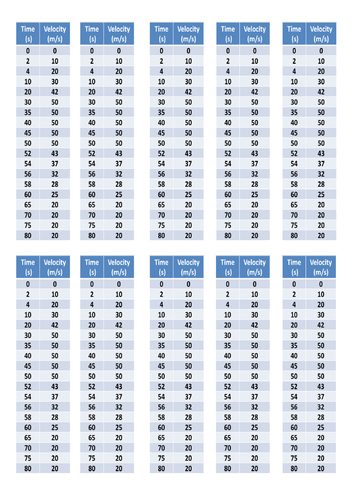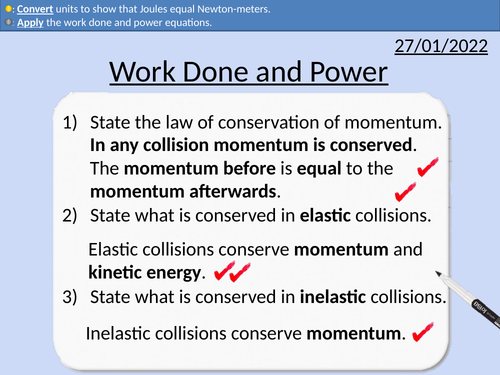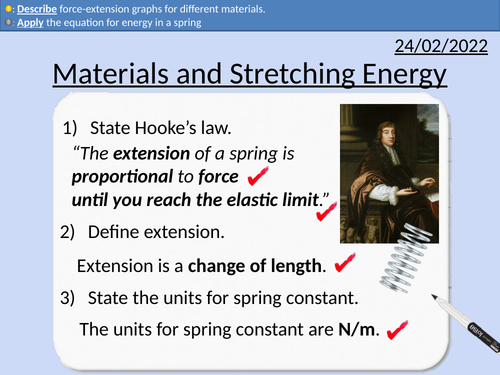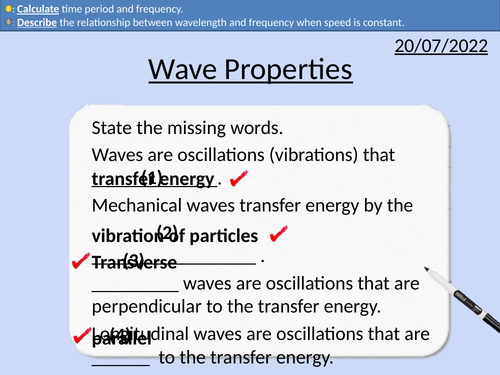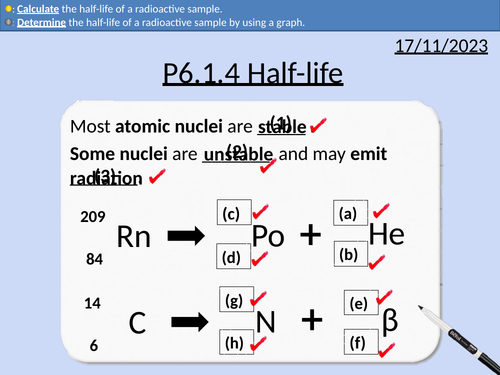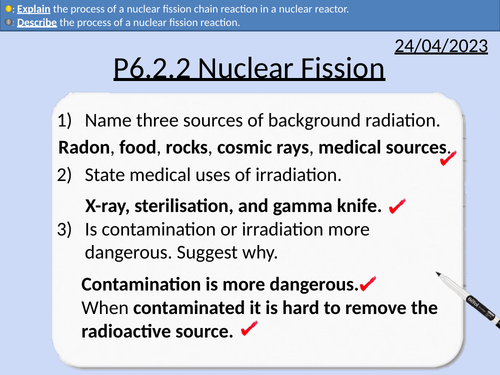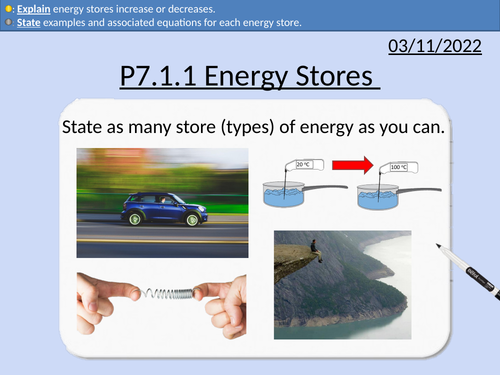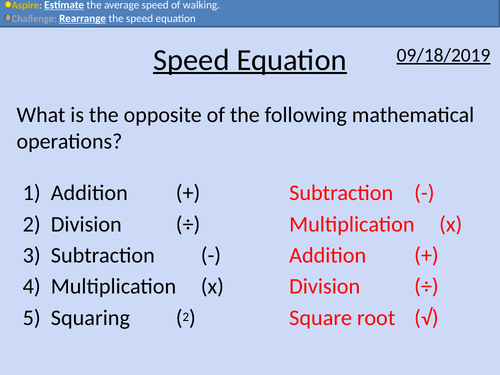496Uploads
162k+Views
70k+Downloads
All resources

GCSE Physics: Every Day Forces
This presentation covers OCR Gateway Physics 9-1 P2.2.5
Presentation comes with worked examples, student questions and answers.
Newton’s first Law
Terminal velocity
Free body diagrams
Plotting data
Determining acceleration for a velocity-time graph
Determining distance traveled for a velocity-time graph

GCSE Physics: Work Done and Power
This presentation covers OCR Gateway Physics 9-1 P2.2.7
Work done equation
Rearranging work done equation
Questions and answers for work done
Power equation and definition
Rearranging power equation
Different units for work done: J, N m, kg m^2/s^2

GCSE Physics: Stretching Springs
These two lesson presentations covers the OCR Gateway Physics 9-1 P2.3.1 material.
• Number of forces needed to deform an object
• Elastic and Plastic definitions
• Hooke’s Law
• Rearranging equations
• Determining the gradient
• Determining the spring constant
• Experimental procedure
• Exam style questions with solutions

GCSE Physics: Moments and Turning Forces
This presentation covers OCR Gateway Physics 9-1 P2.3.4 Turning Forces
Clockwise and anti-clockwise moments
Equation for moments
Rearranging equation
Balancing moments
Principle of moments

GCSE Physics: Simple Machines and Gears
This presentation covers OCR Gateway Physics 9-1 P2.3.5 Simple Machines
• Uses of simple machines
• Simple machines as force multipliers
• Mechanical advantage equation
• Gears – ratios, speed, direction
• Rearranging equations
• Exam style questions with solutions
• Student problems with answers

GCSE Physics: Hydraulic Systems
This presentation covers OCR Gateway Physics 9-1 P2.3.6 Hydraulic Systems
• Uses of hydraulics
• Pressure equation
• Rearranging equation
• Calculating pressure in liquids
• Describing how force multiplies in hydraulic systems
• Worked examples and student problems

GCSE Physics: Gravitational Force and Energy
This presentation covers OCR Gateway Physics 9-1 P2.3.3 Gravitational Force and Energy
Gravitational fields
Gravitational field strength and mass
Gravitational energy and work done
Exam style questions and solutions
Student problems with answers

GCSE Physics: Springs and Energy
This presentation covers OCR Gateway Physics 9-1 P2.3.2
• Spring Energy Equation
• Rearranging equation with two methods
• Problems and worked solutions
• Exam style question and answer
• Analysing force-extension graphs

GCSE Physics: Wave Properties
This presentation covers OCR Gateway Physics 9-1 P5.1.1b Waves and their properties. Includes student activities and full worked answers.
Amplitude
Wavelength
Frequency
Time period
Calculating frequency and equation
Relationship between frequency and wavelength when speed is constant.
Calculating time period from frequency with equations

GCSE OCR Physics P2 Test
35 mark assessment with mark scheme for P2 from OCR Gateway Physics 9-1.
• 5 multiple choice questions
• Scalars and Vectors
• Speed
• Acceleration
• Equation of Motion
• Velocity-time graph
• Included physics equations
• PIN cover sheet

GCSE OCR Physics P2 Scheme of Work
Middle term plan for OCR Gateway Physics P2
This coveres:
Code
Combined or Triple
Number of lessons
Math Skills
Equations Introduced
Skills Developed
Content Covered
Practical or Demo
Bundle

GCSE OCR Physics: P2.1 Motion
All resources for P2.1 GCSE OCR Physics Gateway 9-1.Triple and combined (Higher and Foundation) is covered in this material.
Includes:
Distance, time and speed
Vectors and Scalars
Acceleration
Distance-time graphs
Velocity-time graphs
Equations of motion
Kinetic Energy

GCSE Physics: Half-life
This presentation covers OCR Gateway Physics 9-1 P6.1.4 Half life
All presentations come with student activities and worked solutions.
Definition of half-life
Radioactive decays are random
Finding half-life from a graph
Constructing a half-life graph
Finding the number of half-lives past using ratios

GCSE Physics: Nuclear Fission
This presentation covers OCR Gateway Physics 9-1 P6.2.2 Nuclear Fission
This PowerPoint is a whole lessons included with student activities and animated answers.
Conservation of mass
Uranium as a nuclear fission fuel
Nuclear fission process
Chain reactions in nuclear fission reactions
Control rods and moderators in nuclear reactors
Benefits and disadvantages of nuclear fission reactors.
Mass-Energy Equivalence

GCSE Physics: Energy Stores
This presentation covers OCR Gateway Physics 9-1 P7.1.1 Energy stores
Examples, units, and equations of each energy store:
Kinetic
Gravitational potential
Elastic
Thermal
Magnetic
Electrostatic
Chemical
Nuclear
Student activities with full worked answers also included.

GCSE Physics: Kinetic and Gravitational Energy
This presentation covers OCR Gateway Physics 9-1 P7.1.6 Kinetic and Gravitational Energy
Rearranging Gravitational and Kinetic Energy Equations
Energy Transfers and conservation of energy
Historical Development of physics and pendulums
Creating an experiment to prove conservation of energy
Exam question with worked solutions
Practice questions with worked solutions

GCSE Physics: Electrical Power and Work Done
This presentation covers OCR Gateway Physics 9-1 P7.2.1 Electrical Power and Work Done. All presentations come with student activities and worked solutions.
Definition of power
Converting between W and kW
Converting between seconds, minutes, and hours
Calculating work done in kWh and J
Converting between kWh and J

GCSE Physics: Paying for Electricity
This presentation covers OCR Gateway Physics 9-1 P7.2.1 Paying for Electricity
A unit of electricity being a kilo-watt hour (kWh)
Unit cost and calculating costs
Energy bills
Electrical power
Work done = Power x Time
Power = Potential Difference x Current

GCSE Physics: Speed Equation
This PowerPoint presentation with worked examples and student questions covers:
• The speed equation and units
• Rearranging Equations
• The skill of estimating

GCSE Physics: Scientific Defintions and Speed Experiment
This PowerPoint presentation with worked examples and student questions covers:
• Definitions of accurate and precise
• Definition of resolution
• Definition of repeatable and reproducible
• Planning an experiment for determining speed

